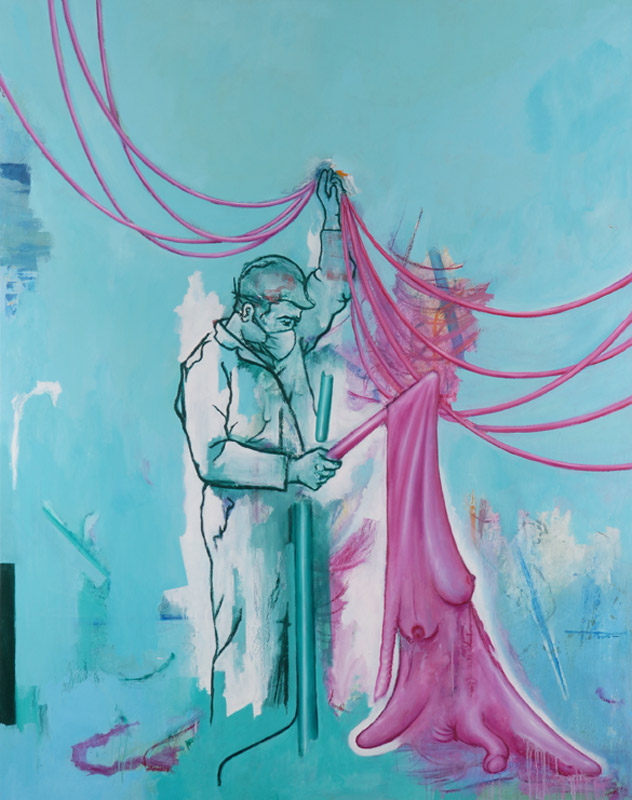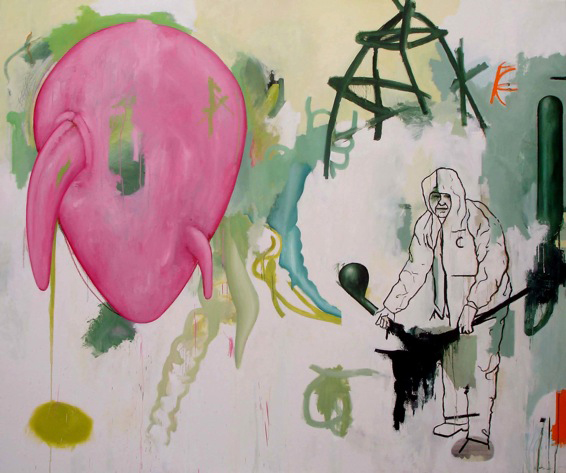

Oil on canvas

Oil painting on canvas

Oil painting on canvas

Oil painting on canvas

Oil on canvas

Oil painting on canvas

Oil painting on canvas

Oil on canvas

Oil painting on canvas

Oil painting on canvas

Oil painting on canvas

Oil painting on canvas

Oil painting on canvas

Oil painting on canvas

Oil painting on canvas

Oil painting on canvas, 200 x 160 cm
Born in 1974 in Normandy, Vincent Gicquel spent his childhood building huts and, when it was raining, reproducing in his father's workshop the paintings of the fathers of modernity (Van Gogh, Monet or Picasso...)
He develops in this way a profound attachment to oil painting and, later on, tragic philosophy. As a reader of Schopenhauer to whom philosophy never gave back but spared nonetheless, Gicquel chose to become a painter because, he said, "I had too much humour to be a serial killer."
Can you tell me about your link with painting?
In what way does it satisfy the fabrication of your images?
I think I took up oil painting for its "classical" side. In each of my works, I emphasise the immutable aspect of things, the fact that nothing ever changes and nothing ever will. Painting is timeless, it appeared with the Cave Man and lived through all the revolutions; my painting questions Man, his destiny, the choice was natural. And at a time when many seem to be announcing the death of painting, I found that choosing this medium was coherent with the foundation of my work. A judicious choice that looks like a bad choice, playing with all these insoluble contradictions. I like all these things that one cannot really define, that slip constantly through our fingers, it is the basis of my work. That being said, I don't think art has much to do with the choice of a medium, art is living while I spend my days painting or hopping, it's exactly the same thing...
And your link to words?
When I start a painting, I sometimes have a vague draft or a drawing of a character, the title often appears later on. My thoughts and way of looking at the world have an influence on my language and my words. Some are extremely important, like "absurd", "death", "art", "meaning"... When a painting takes a road that seems interesting to me, often a title muscles its way in, once again, I don't have much choice in the matter, everything becomes obvious, the painting functions, as does the title.
Their etymology is very important for me, I like titles that seem to indicate something simple, precise, that ends up being much richer than one would think. In the painting Body, the word body seems to indicate the soft pink mass that the man has just discovered, it brings to mind corpses that one finds after a catastrophe... In fact this painting insists much more on our link to the body in general, our link to others and sexuality. The title Body seemed obvious. I made the choice of freedom, but for the rest, one doesn't really choose, things appear naturally when they want and I don't have much say in the matter.
You sometimes compare painting to a gastric exercise?
When I paint, I operate in the same way that a surgeon does, with as much care. I express something in a very precise manner, that is why my titles don't have articles, I want them to be like a word from the dictionary to which I bring meaning... I am forming in this way a sort of glossary, a form of definition of who I am or more precisely what I am not (a default definition). Canvas after canvas, I get closer to myself... I dissect...
You mentioned the mechanical aspect, the machine and the organic aspect, that's very true. I talked about tomographic cuts in one of my texts, it's exactly that, the imagery of my paintings is close to medical imagery. They are at the same time X-rays of our world and sections of my own brain...
I really think there is a link between my paintings and digestion. My work could be in some way a set of instructions on how to digest the world. I would like my canvasses to function in this way too, as pieces of a big machine that would represent the mechanical side of thought (a brain at work) as well as the organic side (that of digestion on a larger scale). One has to imagine peristaltic movements, not of a stomach, but of a brain that, thought after thought, is able to digest certain aspects of the world to better stand it... In this way, art and humour act as gastric juice.
What keeps your figures so busy in your canvasses?
I think my characters act (quite egotistically) for themselves. Their actions have no link with the world that surrounds them and even less with the men that surround them. When I talk about general indifference, it is because the eyes never meet. It is in this Sisyphus-type loneliness that we work.
My characters are condemned men or women, like me, they don't really know what they are here for, I think they don't even try to understand. They do what feels important to them. They struggle with oil painting (the famous soft matter) with inappropriate tools.
Each of my paintings works as a fragment of an interior monologue, there is for me a link between the soliloquy and the purely mechanical repetition of our gestures; we are all puppets, all in the same shithouse. But there is nothing negative there! I am not criticizing anything, I am not protesting against anything. There is nothing cynical in my laughter, there is also nothing barbaric in my way of dissecting the world; I simply ridicule everything that surrounds me, without sparing my work, or the ridiculous man that I am. In the end, there is a great vitality in me that sways from laughter to indifference or salutary serenity. I owe everything to the way I see the world, incidentally there is only one possible way to see the world, the way that it is!
Cortex Athletico, the 28th of August 2009
Marie Canet talks with Vincent Gicquel.